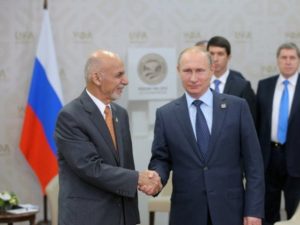
by Asia Maqsood
Afghanistan on the verge of blooming or on the verge of collapsing is yet to be seen. Before this 11-nation Afghan Peace Conference, hosted by Russia, there was a Quadrilateral Coordination Group (QCG) formed in January 2016 to advance the peace process with the participation of US, China, Pakistan, and Afghanistan. These all states conducted talks with Taliban, though Russia sensed marginalized. Eventually, this effort of QCG not accomplished its objective. Instead, Moscow had organized a three-party meeting on Afghanistan included Russia, China, Pakistan.
Russia held the second meeting of six-nation on Feb 15 with the addition of India, Iran. Assessing resurgence of Russia in the contemporary international political scenario, its first and foremost objective is to remind West not to ignore Moscow’s interests in the Afghanistan matter at regional and international platforms. Now, this is the third time that Russia hosted regional talks in five months with the expansion of additional five Central Asian States. The paramount stakeholder US did not join this regional consultation/talk while it’s great role was emphasized simply by the dropping of non-nuclear, Mother of All Bombs in eastern Afghanistan’s Achin district of Nangarhar Province. But also on the eve of regional talks, US State Department acting spokesperson Mark Toner titled this consultation as Russia’s Vanity Project.
The US Administration’s absence from the conference is depicting an increased geopolitical rivalry between US and Russia. In this contemporary world which is not unipolar but going towards multi-polarity. Many emerging powers such as China and India are playing their role regionally and internationally. Russia is also resurging with its role in the different parts of the world. It has also taken steps for International Afghanistan Peace Conference and invited the US on its soil for talks. There is still a conflicting scenario between Russia and US. It is impossible for Russia alone to set up the diplomatic podium to find ways for reconciliation in the war-torn country and settling Afghanistan drawn out struggle and Taliban insurgency. Though Russia is was concerned Afghan resolution and claimed that it does not want to allow ISIS or any other extremist group with ambitions beyond the Afghan border by establishing footholds in the country and threatening the former Soviet States (Central Asian States), most of them have defense agreements with Russia.
Hence, it is pertinent for all global and regional powers to set up a platform to actualize Afghanistan peace and stability on its soil rather anywhere else. Simultaneously equal involvement of US is pre-requisite otherwise another Mother of All Bombs is entirely possible.
As far as Pakistan-Afghanistan relations are concerned, they have been deteriorating with charges and counter-charges regarding sheltering anti-states militant attacks. Another factor which is prominent that is the growing Indo-US ties probing India to play its influential role in Afghanistan. Eventually, AF-Pak ties are not on even keels. All these events which are discussed above have substantial implications on Pakistan. Pakistan should raise its voice that it has been playing an indispensable role in countering terrorism rather promoting on regional and international forums to avoid the Mother of All Bombs on Pakistan adjacent border with Afghanistan.
Tasneem Aslam, Pakistan’s Foreign Office Additional Secretary, said that Pakistan welcomes the extended format of the peace conference on Afghanistan. She told to Sputnik news, ” in our view, it was a useful discussion and was an extended format. Five Central Asian States shares a common border with Afghanistan, and any instability in Afghanistan have an impact on them in many ways. The Pakistani Diplomat said that these regional talks were fruitful and all the participant 11 countries were willing on the idea of reconciliation as this is the only roadmap for Afghanistan. While US State Department acting spokesperson Mark Toner said that Washington regional peace efforts as ” seemed to be a unilateral Russian attempt to assert influence in the region that wasn’t constructive this time.” These conflicting views forecast another war game in this region, pursuing their regional interests. Eventually, the geopolitical rivalry will be increased between these two states.
If we analyze the whole situation in Afghanistan, the conflict in this country is not open like Syria while its low-intensity conflict where the situation escalates sporadically, and there are occasional incidents in each province. The overall situation is not homogenous in this country. Some provinces such as Punjshir, Dykundi, Bamiyan or the northern city of Mazr-e Sharif are relatively less affected by conflict-driven violence. More violence is in northern Kunduz, Southern Helmand or eastern Nangahar.
Assessing the geopolitical alignment in South Asia where China-Pakistan and Russia are getting closer for joint ventures such as joint military exercises between Russia and Pakistan. Later is committed to working with the international community to support efforts for peace and recompilation in Afghanistan. Simultaneously smooth Pakistan-US relations are pertinent for peace and stability in the region. Stability and peace in the South Asian region primarily depend upon the stability in Afghanistan. Pakistan is worried from the violent campaign of IS which shares 2600 Km border with Afghanistan. It is crucial for both Pakistan and Afghanistan to establish greater interactions at different levels specifically at the government to government level for border management, the revival of Afghan peace process and to enhance trade and commerce.
In essence, if the US and other western states were on the negotiation table in Moscow, it would have been a breakthrough for the peaceful solution for the future settlement of Afghanistan. At least this meeting could have paved the way or laid the common ground talks for the final settlement.
